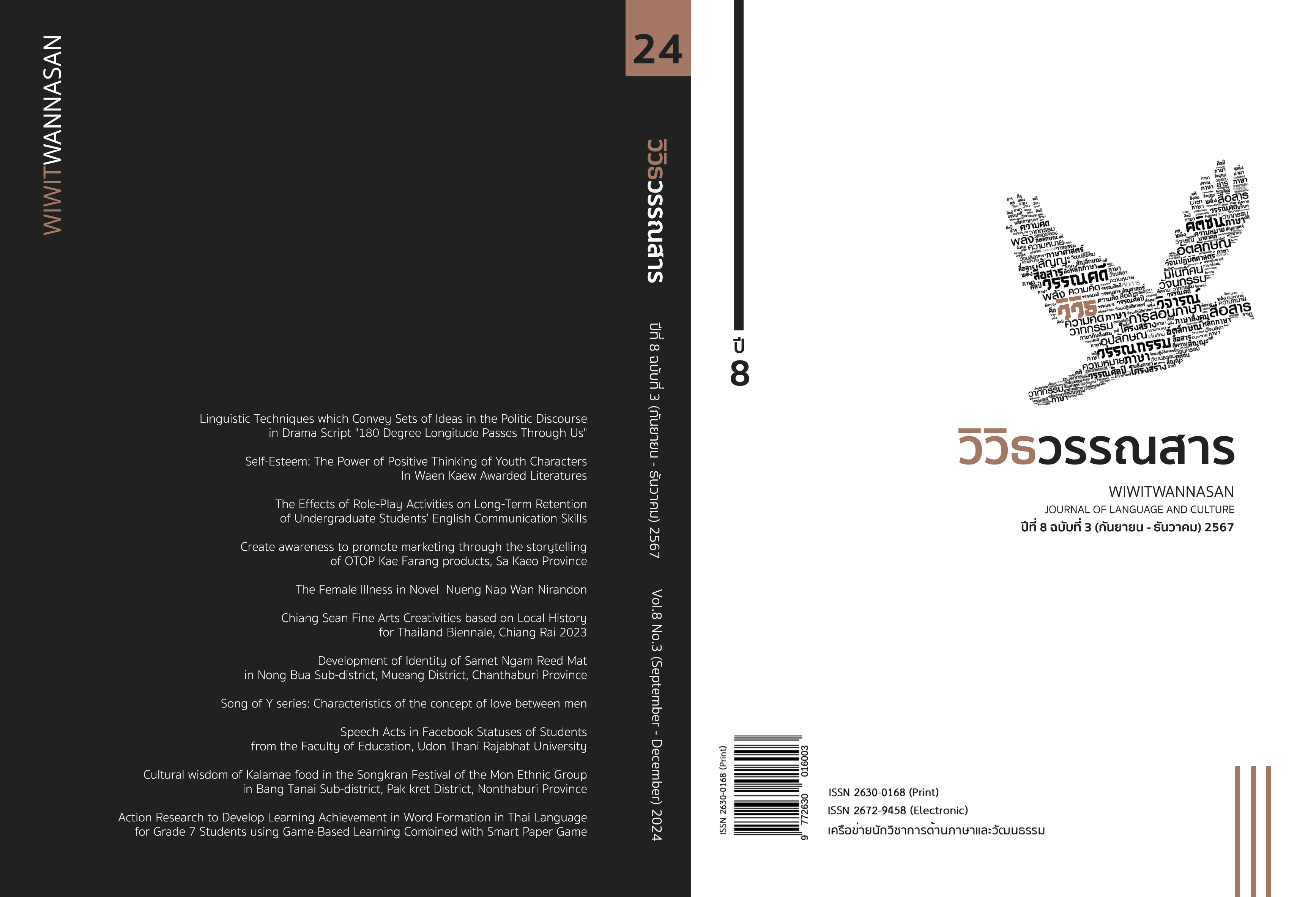กลวิธีทางภาษาที่ถ่ายทอดชุดความคิดในวาทกรรมการเมือง ในบทละครเรื่อง “เส้นลองจิจูดที่ 180 องศาลากผ่านเรา”
Main Article Content
บทคัดย่อ
บทความนี้มีวัตถุประสงค์เพื่อศึกษากลวิธีทางภาษาที่ถ่ายทอดชุดความคิดในวาทกรรมการเมืองในบทละครเรื่อง “เส้นลองจิจูดที่ 180 องศาลากผ่านเรา” ซึ่งออกกาศเมื่อปี 2565 ทางช่อง one31 และเว็บไซต์ movie.trueid.net จำนวนทั้งสิ้น 8 ตอน โดยใช้กรอบ 3 มิติ ตามแนววาทกรรมวิเคราะห์เชิงวิพากษ์ในการศึกษาบทสนทนาและบทบรรยาย ผลการวิจัยพบว่าผู้เขียนบทละครใช้กลวิธีทางภาษาทั้งหมด 9 รูปแบบ ได้แก่ การเลือกใช้คำศัพท์ การใช้โวหารภาพพจน์ การกล่าวตำหนิ การซ้ำกระสวนประโยค การแสดงทัศนภาวะ การใช้สหวาทกรรม การใช้การเปรียบเทียบ การล้อเลียนและเสียดสีและการใช้สหบท ถ่ายทอดชุดความคิด จำนวน 3 ชุดความคิด ประกอบด้วย 1) ชุดความคิดเสรีนิยมและความเท่าเทียมของมนุษย์ 2) ชุดความคิดการเมืองเป็นเรื่องปกติในชีวิต และ 3) ชุดความคิดอำนาจในระบบการศึกษา แต่ละชุดความคิดมีการปะทะโต้แย้งไปมาระหว่างฝ่ายผู้ครองอำนาจนำและฝ่ายต่อต้าน จะเห็นได้ว่าผู้เขียนบทละครมุ่งเสนอให้คนดูละครในฐานะผู้บริโภควาทกรรมเห็นว่าการเมืองได้แทรกซึมเข้าไปในชีวิตประจำวันของพวกเขา ซึ่งได้รับอิทธิพลจากสังคมและวัฒนธรรมที่เกิดขึ้นในขณะนั้น นอกจากนั้น บทละครยังปลูกฝังความคิดของผู้คนให้ตีความการใช้อำนาจอย่างที่ตัวละครมอง
Article Details

อนุญาตภายใต้เงื่อนไข Creative Commons Attribution-NonCommercial-NoDerivatives 4.0 International License.
ลิขสิทธิ์ของบทความเป็นของวารสาร การพิมพ์ซ้ำจะต้องได้ร้บการอนุญาตจากบรรณาธิการวารสาร
เอกสารอ้างอิง
Angkapanichkit, C. (2018). Discourse analysis. Bangkok: Thammasat University. (In Thai)
Bualar, K. (2021). The Critical Discourse Analysis of “The King's Philosophy for Sustainable Development” TV program. Journal of Social Science. Mahamakut Buddhist University, 4 (1), 62-81. (In Thai)
Charoensin-o-larn, C. (2017). Development discourse. Bangkok: Vipasa. (In Thai)
Charoenwong, S., & Chanrueang, T. (2020). Philosophy in film. Bangkok: Ploi. (In Thai)
Dejabutr, S. (2012). Ka Bot Pri or Phee Boon: The History of the People's Struggle Against State Power over the Land of Siam. Bangkok: Gypsy Group.
Fairclough, N. (1995). Critical Discourse Analysis: The Critical Study of Language. London: Longman.
Hinviman, S. (2002). TV dramas: The story of "slaps and kisses" and "husbands and wives" in soap operas. in Entertainment media: The power of nonsense. Bangkok: All About Print. (In Thai)
Jullapatra, T. (2013). Pansak Sukhi as a screenwriter and director of stage plays. https://www.posttoday.com/lifestyle/258065. (In Thai)
Kaencandra, V. & Rawiwan, P. (2022). Political Discourse in Lao Khamhom Short Stories. Journal of Humanities and Social Sciences University of Phayao, 10 (1), 181-202. (In Thai)
Kaewthep, K. (1998). Media studies using critical theory, concepts and research examples. Bangkok: Phapphim. (In Thai)
Kaewthep, K. (1998). Entertainment media: The power of nonsense. Bangkok: Phapphim. (In Thai)
Kanittakul, S. (2021). ‘Cancel or change?’ Transcription from the discussion: Are volunteer camps still the answer to development?. https://thematter.co/social/seminar-university-volunteer-camp/134910. (In Thai)
khammek, S. & Promgird, P. (2022). The study of Citizenship through the Political Sociological Perspective. Journal of Chandrakasemsarn, 28 (1), 78-92.
Krajaejun, P. (2020). ‘Drugs’, a stereotype of hill tribes, reveals the origins of Thai state myths. https://thestandard.co/hill-tribe-reputation-on-drug-of-thai-government/.(In Thai)
Machin, D., & Mayr, A. (2012). How to do critical discourse analysis. London: California. Singapore, New Delhi: SAGE.
Ministry of Education. (2017). National Education Plan 2017-2036. Office of the Education Council : OEC). (In Thai)
Office of The Rayal Society. (2011). Royal Institute Dictionary. Nanmeebook.
Samudavanija, C. (1980). Politic and Administration. Bangkok: Chulalongkorn University. Faculty of Political Science. (In Thai)
sanook.com, (2008). A new history of Thai education and drama. https://www.sanook.com/campus/911443. (In Thai)
Sibplang, P. (2020). Stop forcing or cutting: The feelings of students who are confined under authoritarianism in schools. https://thematter.co/social/hair-rule-and-authoritarianism-in-school/116163. (In Thai)
Sombatpoonsiri, J. (2015). Laughing at Power: Humor and Nonviolent Protest. Bangkok: Matichon. (In Thai)
Sroikudrua, T. (2015). Language and Ideology of Dignity in the Discourse of School Marching Songs in Thailand. KKU International Journal of Humanities and Social Sciences. 8(3), 44-65. (In Thai)
Sungchai, N. (2009). Thai TV Drama Script Writing: Creation Process and Techniques. Academic Journal University of the Thai Chamber of Commerce, 29 (3), 139-158. (In Thai)
Thammachot, T. (2010). Discourse. https://prachatai.com/journal/2010/12/32341. (In Thai)
Thepnarintra, P. (2015). Authoritarianism in the education system. https://prachatai.com/journal/2015/08/60993. (In Thai)
Thiensawangchai, S. & Noyjarean, N. (2023). Mother: a Reflection of Motherhood Portrays in the Language and Concept of Thai People. Monk College Na Korn Lampang, 12 (2), 17-30. (In Thai)
Van Dijk, T. A. (2003). Critical Discourse Analysis. In D. S. D. Tannen and H. Hamilton (Eds.), Handbook of Discourse Analysis, (pp. 352-371). Oxford: Blackwell.
Wongsakham, N. & Pewporchai, P. (2016). Language and Ideology in the “Dern Nah Pra Ted Thai : Thailand Moves Forward” Television program. Journal of Arts, Ubon Ratchathani University, 12 (2), 55-81. (In Thai)


